

Library. Lead, Don't Lecture: A New Approach to Teaching. His teacher, Lisa Suarez-Caraballo, watches him, beaming.
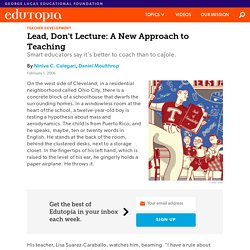
"I have a rule about paper airplanes," she explains. "You can only throw them at the appropriate place and the appropriate time. " Here, that means at the airstrip at the back of the room -- a tape measure fastened to the floor -- and during an experiment. The student walks to where the plane landed, and he stoops low to see how far it flew.
"Seis cientos y setenta . . . six hundred and seventy," he says, providing the measurement in centimeters. Teaching History: The Five-Minute Lecture Rule. A MiddleWeb Blog This year is already shaping up to be at least as exciting as it will be exhausting.
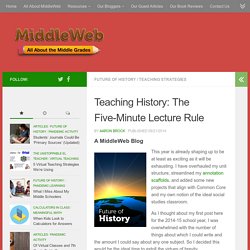
I have overhauled my unit structure, streamlined my annotation scaffolds, and added some new projects that align with Common Core and my own notion of the ideal social studies classroom. As I thought about my first post here for the 2014-15 school year, I was overwhelmed with the number of things about which I could write and the amount I could say about any one subject. So I decided this would be the ideal time to extoll the virtues of brevity. 5 Alternatives to Lecturing. It puts kids to sleep — but teachers keep lecturing anyway. Here’s what to do about it. 50 Alternatives To Lecturing. By TeachThought Staff As teachers, when we lecture, we have the best of intentions.

We have a concept we want the class to understand, so we stand and explain it to them. We give them background. Offer details. Nine Alternatives to Lecturing. Full article: Implications for educational practice of the science of learning and development. Introduction As knowledge regarding human development and learning has grown at a rapid pace, the opportunity to shape more effective educational practices has also increased.
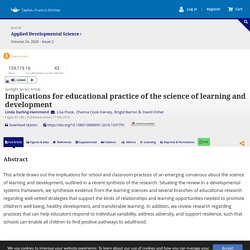
Taking advantage of these advances, however, requires integrating insights across multiple fields—from the biological and neurosciences to psychology, sociology, developmental and learning sciences—and connecting them to knowledge of successful approaches that is emerging in education. This article seeks to contribute to this process by drawing out the implications for school and classroom practices of an emerging consensus about the science of learning and development (SoLD), outlined in a recent synthesis of the research (Cantor, Osher, Berg, Steyer, & Rose, 2018Cantor, P., Osher, D., Berg, J., Steyer, L., & Rose, T. (2018).
Malleability, plasticity, and individuality: How children learn and develop in context. Published online: 17 February 2019 Figure 1. Supportive environmental conditions Principles for practice. 32 Research-Based Instructional Strategies - 32 Research-Based Instructional Strategies by TeachThought Staff You want to teach with what’s been proven to work.
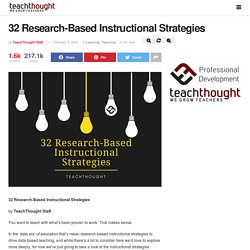
That makes sense. Marzano 13 Teaching Best Practices. As an edtech company, Edmentum certainly believes in the promise of online solutions to improve student outcomes and empower teachers with additional tools to provide effective, individualized instruction.

However, educational technology is an incredibly young field, and everyone – educators, developers, and students alike – is still learning how best to use these tools. A lot of brain power is being dedicated to answering these complex questions. One such effort comes from the Marzano Research Laboratory (MRL), whose experts conducted A Study of Best Practices in Edmentum Online Solutions, looking at Edmentum’s online solutions in various settings to evaluate the relationship between student learning and effective pedagogical practices with respect to the use of online instruction. Marzano Dimension One: Strategies involving routine events. Cognitive Load Theory - Learning Skills From MindTools.com.
© iStockphotorweisswald Don't overload your brain when you want to learn better. Have you ever been on a course where the trainer went through his material so quickly that you barely learned a thing? A Better List Of Ideas For Project-Based Learning. 50 Smart Ideas For Project-Based Learning by TeachThought Staff.
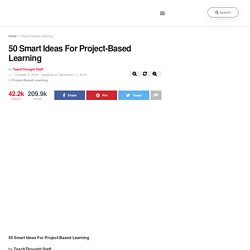
How The Lesson Study Approach Can Improve Your Teaching - How The Lesson Study Approach Can Improve Your Teaching contributed by Vicki Collet Making teaching a shared and public practice supports improved instruction.
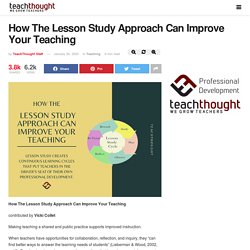
When teachers have opportunities for collaboration, reflection, and inquiry, they “can find better ways to answer the learning needs of students” (Lieberman & Wood, 2002, p. 42). Teacher inquiry makes us question practices that have become stale, generate innovation, and create dynamic learning for ourselves and our students. Over the past decade, I’ve participated in teacher inquiry using a process called Lesson Study.
When participating in Lesson Study, you will collaboratively plan lessons that become the focus of inquiry on effective teaching practices. A model for the learning process. And why it helps to have one. One of the most powerful ideas I’ve engaged with recently is using a diagram to visualise a shared model of the learning process; using it to get a feel for how learning works in general but also to identify reasons for why it can sometimes not happen.
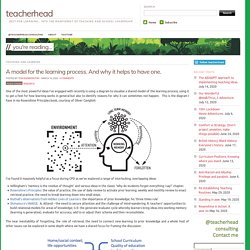
This is the diagram I have in my Rosenshine Principles book, courtesy of Oliver Caviglioli: I’ve found it massively helpful as a focus during CPD as we’ve explored a range of interlocking, overlapping ideas: Willingham’s ‘memory is the residue of thought’ and various ideas in the classic ‘Why do students forget everything I say?’ 18 Alternatives to Essays. As a history teacher, I've always struggled with the idea of giving students essays.
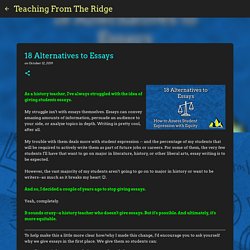
My struggle isn't with essays themselves. Essays can convey amazing amounts of information, persuade an audience to your side, or analyze topics in depth. Writing is pretty cool, after all. A List of Brain-based Strategies to Create Effective eLearning. There is a simple way to design effective eLearning courses about any subject: brain-based learning. This instructional approach was defined by Hileman in 2006 and has since inspired many “brain compatible designers” — those who seek to understand the principle and reasoning behind their teaching. The idea behind the concept is that learning is innate and linked to biological and chemical processes in the human brain.
Much of the time, eLearning instructors are unaware that they are hindering the learning process through ineffective training methods and inappropriate design. When eLearning professionals have a greater knowledge of the brain, they are able to make better decisions about design and create richer learning conditions that attend to students’ social and emotional needs. Creating brain-based courses is actually relatively easy, especially when following the acronym B.R.A.I.N. What is Passive Learning?
Passive learning doesn’t have a wide variety of examples, in spite of how common it is in education. If passive learning is viewed as a teaching strategy in an educational setting, from beginning to end, it might look like these situations. An educator verbalizes information to students and checks if they know it at a later date, without providing additional learning experiences specific to that information.Students complete a reading assignment and are under formal or informal expectations to understand what they read.An educator verbalizes instructions to students and expects them to follow the instructions exactly.Students complete a lab by following step-by-step instructions and must write a report to show their understanding of the lab concepts.Students watch a video and are given a quiz immediately after.An educator works through example problems on the board and then gives students a graded assignment to complete similar problems.
Learning Theories and Models summaries - Educational Psychology. 25914 081222 Campbell Ch1 excerpt.